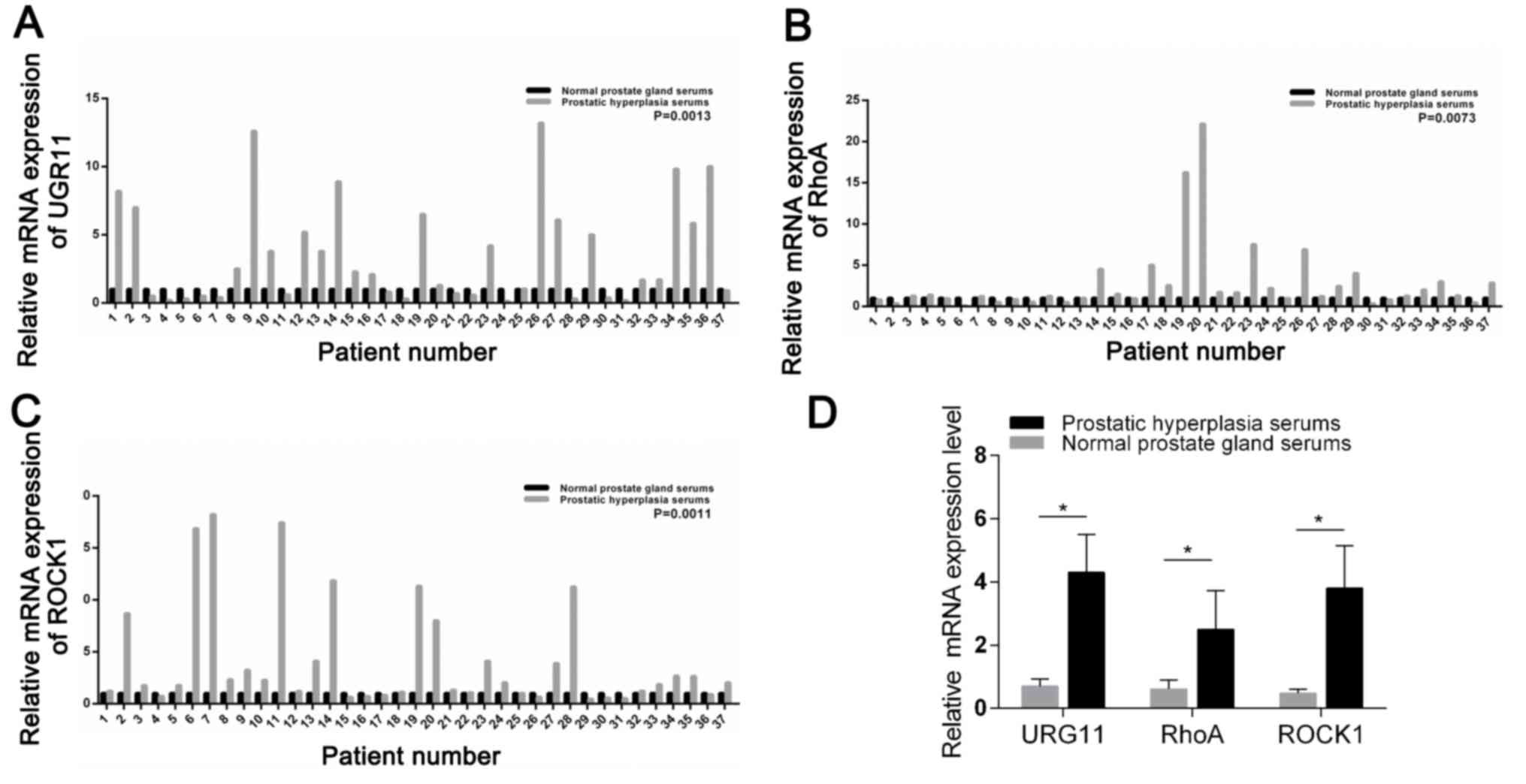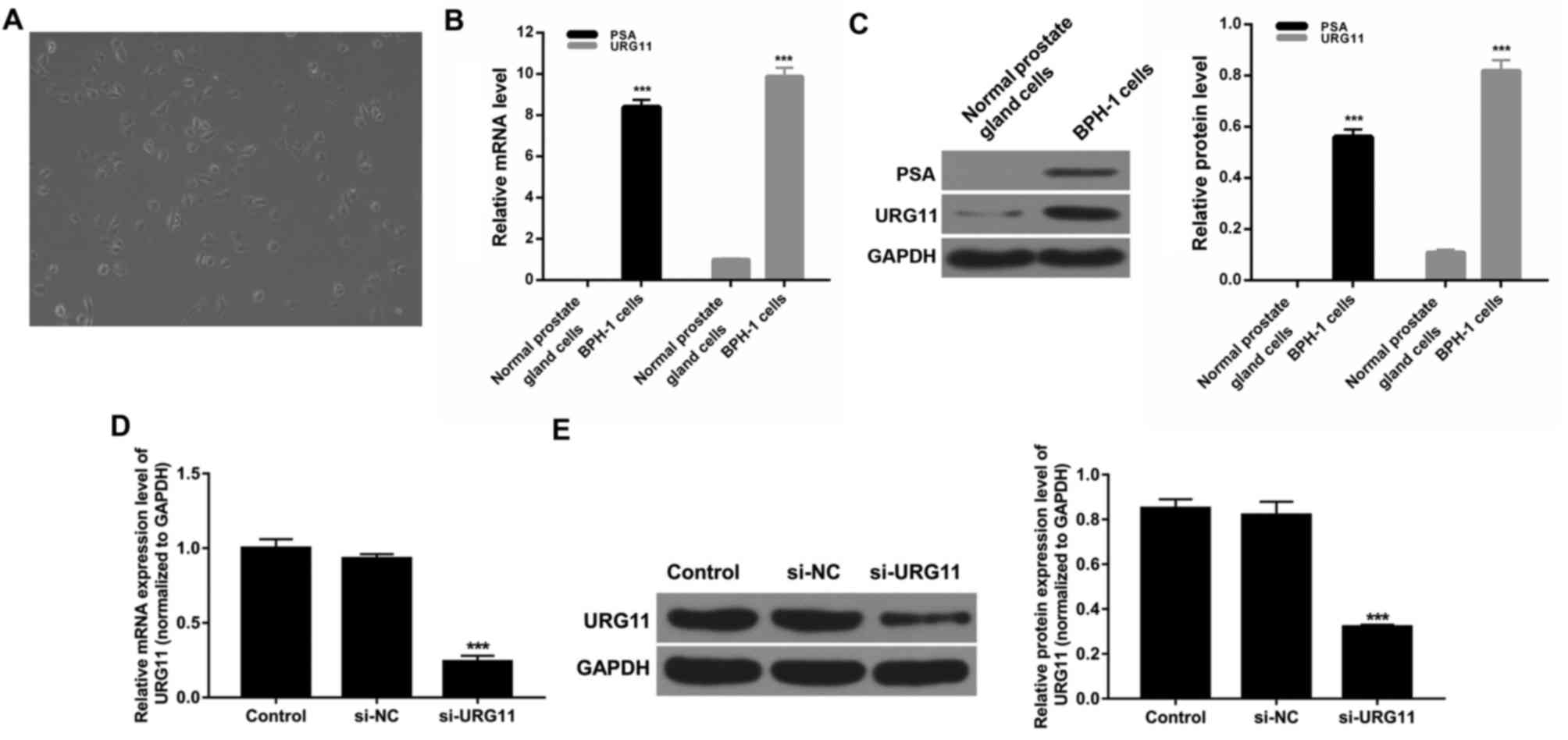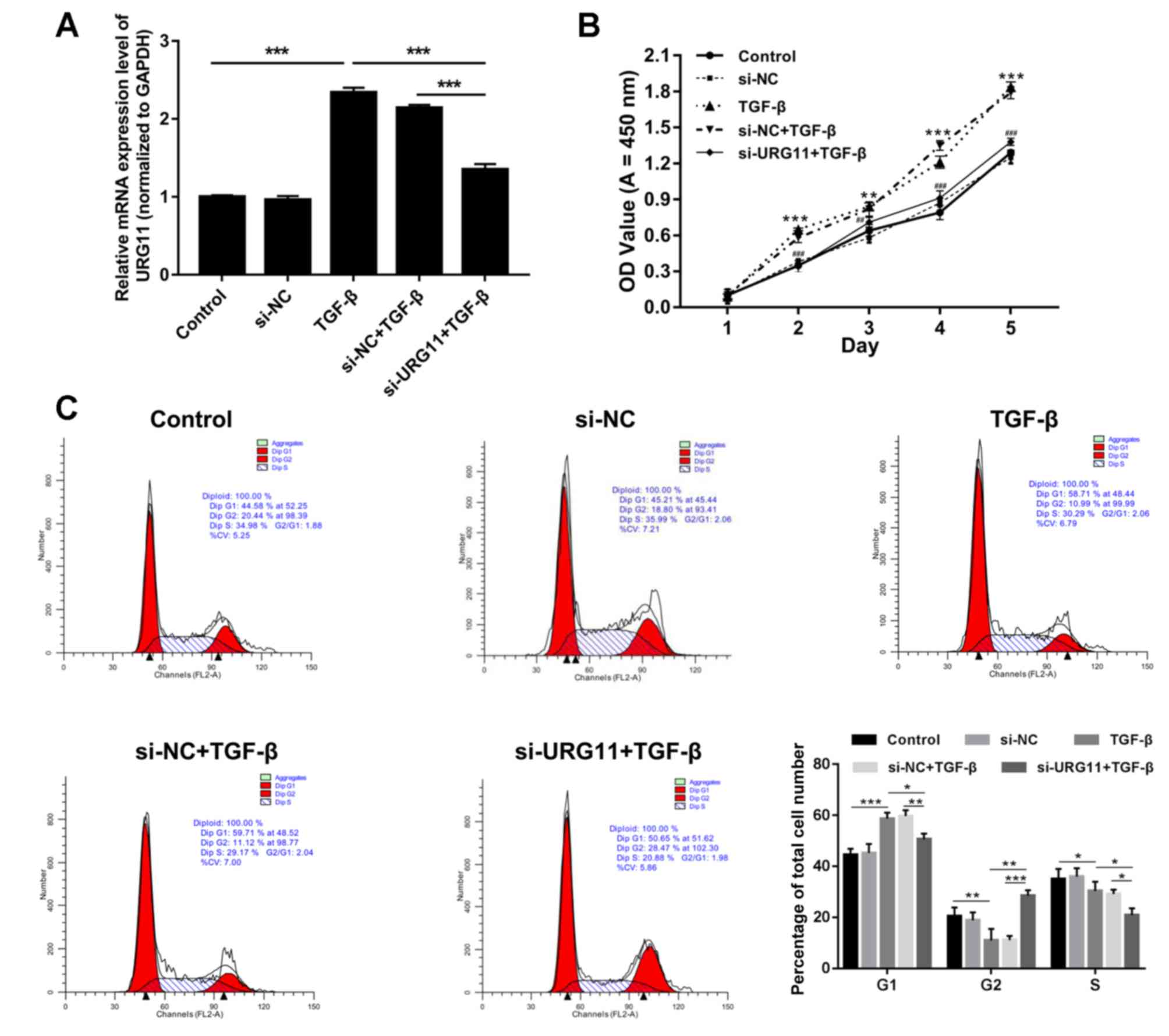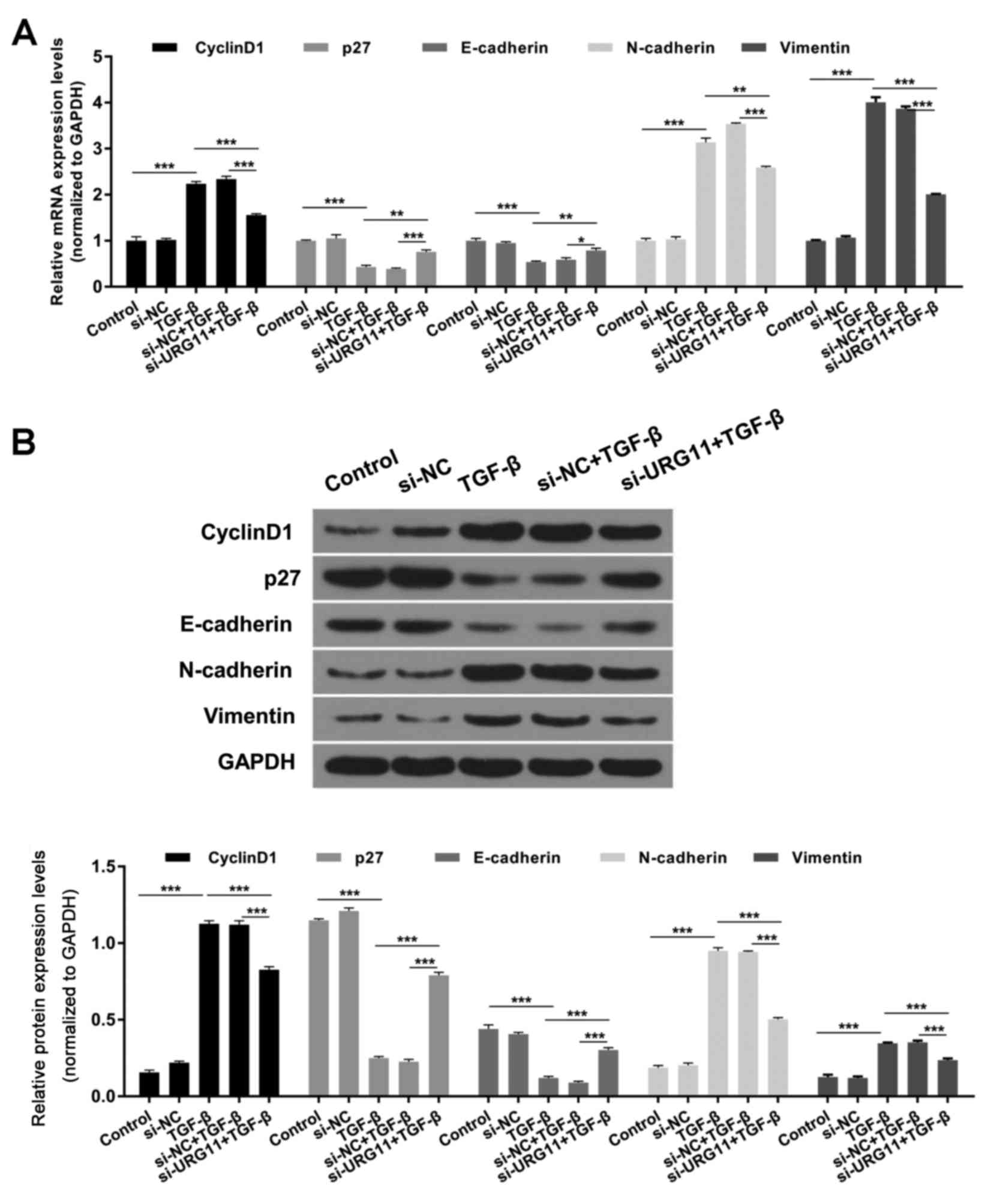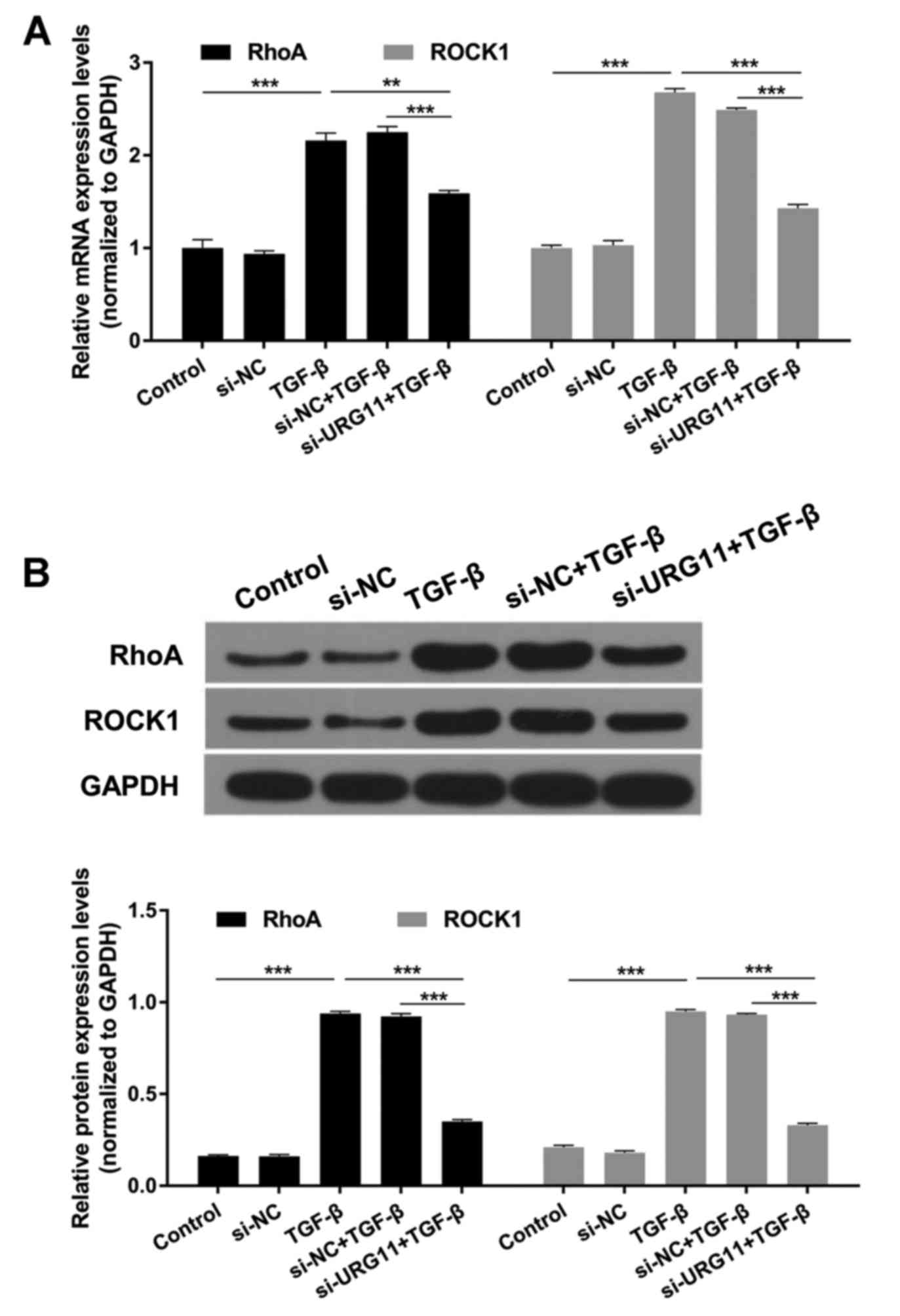|
1
|
Mobley D, Feibus A and Baum N: Benign
prostatic hyperplasia and urinary symptoms: Evaluation and
treatment. Postgrad Med. 127:301–307. 2015. View Article : Google Scholar : PubMed/NCBI
|
|
2
|
Corona G, Vignozzi L, Rastrelli G, Lotti
F, Cipriani S and Maggi M: Benign prostatic hyperplasia: A new
metabolic disease of the aging male and its correlation with sexual
dysfunctions. Int J Endocrinol. 2014:3294562014. View Article : Google Scholar : PubMed/NCBI
|
|
3
|
Lian Z, Liu J, Li L, Li X, Clayton M, Wu
MC, Wang HY, Arbuthnot P, Kew M, Fan D and Feitelson MA: Enhanced
cell survival of Hep3B cells by the hepatitis B × antigen effector,
URG11, is associated with upregulation of beta-catenin. Hepatology.
43:415–424. 2006. View Article : Google Scholar : PubMed/NCBI
|
|
4
|
Xie H and Liu J: Increased expression
URG11 in hepatocellular carcinoma tissues promotes the growth of
hepatocellular carcinoma cells. Xi Bao Yu Fen Zi Mian Yi Xue Za
Zhi. 31:1523–1527. 2015.(In Chinese). PubMed/NCBI
|
|
5
|
Zou X, Li X, Liu J, Lian Z, Fan R, Du R,
Xie H, Song J and Fan D: Preparation and characterization of a
specific monoclonal antibody against a new gene product: URG11.
Hybridoma (Larchmt). 25:378–381. 2006. View Article : Google Scholar : PubMed/NCBI
|
|
6
|
Du R, Xia L, Sun S, Lian Z, Zou X, Gao J,
Xie H, Fan R, Song J, Li X, et al: URG11 promotes gastric cancer
growth and invasion by activation of beta-catenin signalling
pathway. J Cell Mol Med. 14:621–635. 2010.PubMed/NCBI
|
|
7
|
Du R, Huang C, Bi Q, Zhai Y, Xia L, Liu J,
Sun S and Fan D: URG11 mediates hypoxia-induced
epithelial-to-mesenchymal transition by modulation of E-cadherin
and beta-catenin. Biochem Biophys Res Commun. 391:135–141. 2010.
View Article : Google Scholar : PubMed/NCBI
|
|
8
|
Lamouille S, Xu J and Derynck R: Molecular
mechanisms of epithelial-mesenchymal transition. Nat Rev Mol Cell
Biol. 15:178–196. 2014. View
Article : Google Scholar : PubMed/NCBI
|
|
9
|
Shao R, Shi J, Liu H, Shi X, Du X, Klocker
H, Lee C, Zhu Y and Zhang J: Epithelial-to-mesenchymal transition
and estrogen receptor alpha mediated epithelial dedifferentiation
mark the development of benign prostatic hyperplasia. Prostate.
74:970–982. 2014. View Article : Google Scholar : PubMed/NCBI
|
|
10
|
Syed V: TGF-β signaling in cancer. J Cell
Biochem. 117:1279–1287. 2016. View Article : Google Scholar : PubMed/NCBI
|
|
11
|
Katsuno Y, Lamouille S and Derynck R:
TGF-β signaling and epithelial-mesenchymal transition in cancer
progression. Curr Opin Oncol. 25:76–84. 2013. View Article : Google Scholar : PubMed/NCBI
|
|
12
|
Chew TW, Liu XJ, Liu L, Spitsbergen JM,
Gong Z and Low BC: Crosstalk of ras and rho: Activation of RhoA
abates Kras-induced liver tumorigenesis in transgenic zebrafish
models. Oncogene. 33:2717–2727. 2014. View Article : Google Scholar : PubMed/NCBI
|
|
13
|
Bryan BA, Dennstedt E, Mitchell DC, Walshe
TE, Noma K, Loureiro R, Saint-Geniez M, Campaigniac JP, Liao JK and
D'Amore PA: RhoA/ROCK signaling is essential for multiple aspects
of VEGF-mediated angiogenesis. FASEB J. 24:3186–3195. 2010.
View Article : Google Scholar : PubMed/NCBI
|
|
14
|
Riou P, Kjær S, Garg R, Purkiss A, George
R, Cain RJ, Bineva G, Reymond N, McColl B, Thompson AJ, et al:
14-3-3 proteins interact with a hybrid prenyl-phosphorylation motif
to inhibit G proteins. Cell. 153:640–653. 2013. View Article : Google Scholar : PubMed/NCBI
|
|
15
|
Zhao ZS and Manser E: PAK and other
Rho-associated kinases-effectors with surprisingly diverse
mechanisms of regulation. Biochem J. 386:201–214. 2005. View Article : Google Scholar : PubMed/NCBI
|
|
16
|
Chan CH, Lee SW, Li CF, Wang J, Yang WL,
Wu CY, Wu J, Nakayama KI, Kang HY, Huang HY, et al: Deciphering the
transcriptional complex critical for RhoA gene expression and
cancer metastasis. Nat Cell Biol. 12:457–467. 2010. View Article : Google Scholar : PubMed/NCBI
|
|
17
|
Livak KJ and Schmittgen TD: Analysis of
relative gene expression data using real-time quantitative PCR and
the 2(-Delta Delta C(T)) method. Methods. 25:402–408. 2001.
View Article : Google Scholar : PubMed/NCBI
|
|
18
|
Wendt MK, Tian M and Schiemann WP:
Deconstructing the mechanisms and consequences of TGF-β-induced EMT
during cancer progression. Cell Tissue Res. 347:85–101. 2012.
View Article : Google Scholar : PubMed/NCBI
|
|
19
|
Riento K and Ridley AJ: Rocks:
Multifunctional kinases in cell behaviour. Nat Rev Mol Cell Biol.
4:446–456. 2003. View
Article : Google Scholar : PubMed/NCBI
|
|
20
|
Hu B, Xu C, Cao P, Tian Y, Zhang Y, Shi C,
Xu J, Yuan W and Chen H: TGF-β stimulates expression of chondroitin
polymerizing factor in nucleus pulposus cells through the Smad3,
RhoA/ROCK1 and MAPK signaling pathways. J Cell Biochem.
119:566–579. 2018. View Article : Google Scholar : PubMed/NCBI
|
|
21
|
Wu ML, Chen CH, Lin YT, Jheng YJ, Ho YC,
Yang LT, Chen L, Layne MD and Yet SF: Divergent signaling pathways
cooperatively regulate TGFβ induction of cysteine-rich protein 2 in
vascular smooth muscle cells. Cell Commun Signal. 12:222014.
View Article : Google Scholar : PubMed/NCBI
|
|
22
|
Mohamed JS and Boriek AM: Stretch augments
TGF-beta1 expression through RhoA/ROCK1/2, PTK, and PI3K in airway
smooth muscle cells. Am J Physiol Lung Cell Mol Physiol.
299:L413–L424. 2010. View Article : Google Scholar : PubMed/NCBI
|
|
23
|
Bechis SK, Otsetov AG, Ge R and Olumi AF:
Personalized medicine for the management of benign prostatic
hyperplasia. J Urol. 192:16–23. 2014. View Article : Google Scholar : PubMed/NCBI
|
|
24
|
Dong X, Chang ES, Zeng P and Simon MA:
Suicide in the global chinese aging population: A review of risk
and protective factors, consequences, and interventions. Aging Dis.
6:121–130. 2015. View Article : Google Scholar : PubMed/NCBI
|
|
25
|
Wang W, Guo Y, Zhang D, Tian Y and Zhang
X: The prevalence of benign prostatic hyperplasia in mainland
China: Evidence from epidemiological surveys. Sci Rep. 5:135462015.
View Article : Google Scholar : PubMed/NCBI
|
|
26
|
Lian Z, Liu J, Li L, Li X, Tufan NL,
Clayton M, Wu MC, Wang HY, Arbuthnot P, Kew M and Feitelson MA:
Upregulated expression of a unique gene by hepatitis B × antigen
promotes hepatocellular growth and tumorigenesis. Neoplasia.
5:229–244. 2003. View Article : Google Scholar : PubMed/NCBI
|
|
27
|
Liu ZL, Wu J, Wang LX, Yang JF, Xiao GM,
Sun HP and Chen YJ: Knockdown of upregulated gene 11 (URG11)
inhibits proliferation, invasion, and β-catenin expression in
Non-small cell lung cancer cells. Oncol Res. 24:197–204. 2016.
View Article : Google Scholar : PubMed/NCBI
|
|
28
|
Davis FM, Stewart TA, Thompson EW and
Monteith GR: Targeting EMT in cancer: Opportunities for
pharmacological intervention. Trends Pharmacol Sci. 35:479–488.
2014. View Article : Google Scholar : PubMed/NCBI
|
|
29
|
Hyun KA, Koo GB, Han H, Sohn J, Choi W,
Kim SI, Jung HI and Kim YS: Epithelial-to-mesenchymal transition
leads to loss of EpCAM and different physical properties in
circulating tumor cells from metastatic breast cancer. Oncotarget.
7:24677–24687. 2016. View Article : Google Scholar : PubMed/NCBI
|
|
30
|
Nijkamp MM, Span PN, Hoogsteen IJ, van der
Kogel AJ, Kaanders JH and Bussink J: Expression of E-cadherin and
vimentin correlates with metastasis formation in head and neck
squamous cell carcinoma patients. Radiother Oncol. 99:344–348.
2011. View Article : Google Scholar : PubMed/NCBI
|
|
31
|
Liu J, Lian Z, Han S, Waye MM, Wang H, Wu
MC, Wu K, Ding J, Arbuthnot P, Kew M, et al: Downregulation of
E-cadherin by hepatitis B virus X antigen in hepatocellullar
carcinoma. Oncogene. 25:1008–1017. 2006. View Article : Google Scholar : PubMed/NCBI
|
|
32
|
Arzumanyan A, Friedman T, Kotei E, Ng IO,
Lian Z and Feitelson MA: Epigenetic repression of E-cadherin
expression by hepatitis B virus × Antigen in liver cancer.
Oncogene. 31:563–572. 2012. View Article : Google Scholar : PubMed/NCBI
|
|
33
|
Riethmacher D, Brinkmann V and Birchmeier
C: A targeted mutation in the mouse E-cadherin gene results in
defective preimplantation development. Proc Natl Acad Sci USA.
92:855–859. 1995. View Article : Google Scholar : PubMed/NCBI
|
|
34
|
Huber MA, Kraut N and Beug H: Molecular
requirements for epithelial-mesenchymal transition during tumor
progression. Curr Opin Cell Biol. 17:548–558. 2005. View Article : Google Scholar : PubMed/NCBI
|
|
35
|
Talar B and Czyz M: TGF-β signaling
pathways in cancers. Postepy Hig Med Dosw (Online). 67:1008–1017.
2013.(In Polish). View Article : Google Scholar : PubMed/NCBI
|
|
36
|
Gao J, Zhu Y, Nilsson M and Sundfeldt K:
TGF-β isoforms induce EMT independent migration of ovarian cancer
cells. Cancer Cell Int. 14:722014. View Article : Google Scholar : PubMed/NCBI
|
|
37
|
Surma M, Wei L and Shi J: Rho kinase as a
therapeutic target in cardiovascular disease. Future Cardiol.
7:657–671. 2011. View Article : Google Scholar : PubMed/NCBI
|
|
38
|
Marjoram RJ, Lessey EC and Burridge K:
Regulation of RhoA activity by adhesion molecules and
mechanotransduction. Curr Mol Med. 14:199–208. 2014. View Article : Google Scholar : PubMed/NCBI
|
|
39
|
Lotz-Jenne C, Lüthi U, Ackerknecht S,
Lehembre F, Fink T, Stritt M, Wirth M, Pavan S, Bill R, Regenass U,
et al: A high-content EMT screen identifies multiple receptor
tyrosine kinase inhibitors with activity on TGFβ receptor.
Oncotarget. 7:25983–26002. 2016. View Article : Google Scholar : PubMed/NCBI
|















